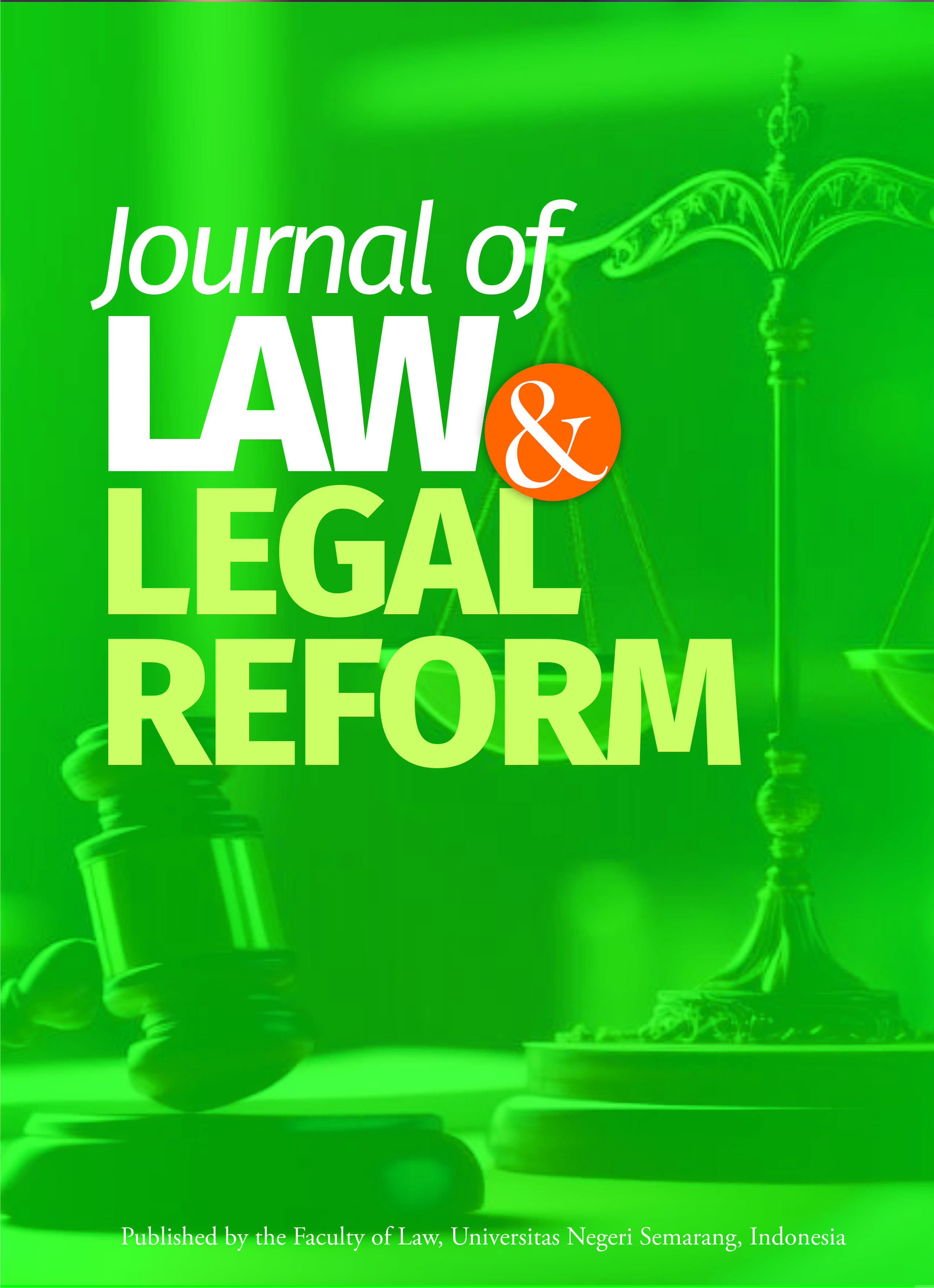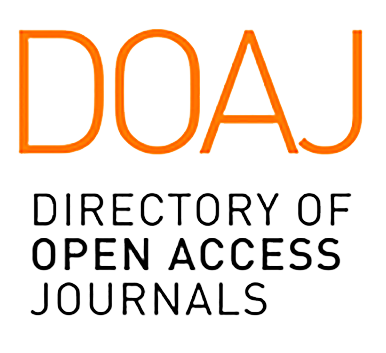Economic Assistance as a Form of Non-Penal Policy in Countering Terrorism for Ex-Prisoners in Indonesia
DOI:
https://doi.org/10.15294/jllr.vol5i2.7558Keywords:
Economic Assistance, Ex-Prisoners of Terrorism, Non-Penal PolicyAbstract
This study highlights the critical role of economic assistance as a non-penal policy in countering terrorism among ex-prisoners in Indonesia. Economic stability emerges as a significant factor in mitigating criminal behavior, particularly terrorism, by addressing the economic roots of radical ideologies. Traditional counterterrorism measures in Indonesia have predominantly focused on punitive approaches, targeting individuals who have committed terrorism offenses through formulation, judicial application, and executive enforcement of penal policies. However, there is an increasing recognition of the limitations of solely punitive measures in preventing recidivism and addressing the broader socio-economic factors that contribute to radicalization. The findings underscore the efficacy of economic interventions in disrupting the cycle of terrorism by providing viable alternatives to individuals vulnerable to radical ideologies due to economic hardships. By offering economic assistance, such as vocational training, job placement programs, and financial support, governments can empower ex-prisoners to reintegrate into society positively. This approach not only enhances the economic stability of former offenders but also reduces their susceptibility to re-engaging in terrorist activities. Moreover, integrating economic welfare assistance into broader counterterrorism strategies promotes a holistic approach that complements punitive measures with preventive measures. It acknowledges the need for synergy between punitive and non-penal policies to effectively combat terrorism. Such integrated strategies are essential for long-term success in reducing terrorism by addressing its socio-economic underpinnings and fostering sustainable peace and stability. In conclusion, this study advocates for the prioritization and implementation of economic assistance programs tailored for ex-prisoners in Indonesia as a crucial component of comprehensive counterterrorism efforts. By investing in economic stability, governments can effectively undermine the appeal of radical ideologies and contribute to lasting security and societal resilience.
References
Aisy, Rohadhatul. “Non-Penal Deradicalization of Former Terrorist Prisoners (Study at Lingkar Perdamaian Foundation).” Journal of Law and Legal Reform 2, no. 2 (2021): 243–62. https://doi.org/10.15294/jllr.v2i2.46487.
Alper, Benedict S., A. E. Bottoms, and R. H. Preston. “The Coming Penal Crisis: A Criminological and Theological Exploration.” Contemporary Sociology 11, no. 2 (1982): 183. https://doi.org/10.2307/2067025.
Andini, Okti Putri. "Cyber Terrorism Criminal Acts in the Perspective of Transnational Organized Crime." Unnes Law Journal 7, no. 2 (2021): 333-346.
Arief, Barda Nawawi. Bunga Rampai Kebijakan Hukum Pidana. Jakarta: Kencana, 2016.
Aslam, Mohd Mizan. “Preventing and Countering Violent Extremism: Lessons from Selected Countries.” Islam Realitas: Journal of Islamic & Social Studies 6, no. 1 (2020): 87. https://doi.org/10.30983/islam_realitas.v6i1.3152.
Awan, Imran. “Cyber-Extremism: Isis and the Power of Social Media.” Society 54, no. 2 (2017): 138–49. https://doi.org/10.1007/s12115-017-0114-0.
Azil Masykur. “Deradikalisasi Pelaku Teror.” Suara Merdeka, 2016.
Country Report. “United Nations Congress on Crime Prevention and Criminal Justice” 84409, no. May (2005): 1–3.
Fajar, Mukti, and Yulianto Achmad. Dualisme Penelitian Hukum: Normatif & Empiris. Yogyakarta: Pustaka Pelajar, 2010.
Hoecke, Mark Van. “Methodology of Comparative Legal Research.” Law and Method, December 2015, 1–35. https://doi.org/10.5553/REM/.000010.
Hoefnagels, G. Peter. The Other Side of Criminology: An Inversion of the Concept of Crime. Dordrecht: Kluwer, 1973. https://doi.org/10.1007/978-94-017-4495-9.
Indrawan, Jerry, and M. Prakoso Aji. “Efektivitas Program Deradikalisasi Badan Nasional Penanggulangan Terorisme Terhadap Narapidana Terorisme Di Indonesia.” Jurnal Pertahanan & Bela Negara 9, no. 2 (2019): 1. https://doi.org/10.33172/jpbh.v9i2.561.
Kamaludin, Iip. “Efektifitas Pembinaan Narapidana Terorisme Dalam Upaya Deradikalisasi di Lembaga Pemasyratakatan.” Al’ Adl : Jurnal Hukum 12, no. 2 (2020): 373–400.
Kamaludin, Ahmad, and Iskandar Iskandar. "Islamic Fanatism and Terrorism Cases in Indonesia the Perspective of Islamic Criminal Law." El-Mashlahah 12, no. 2 (2022): 153-163.
Kennedy, Duncan. “The Hermeneutic of Suspicion in Contemporary American Legal Thought.” Law and Critique 25, no. 2 (2014): 91–139. https://doi.org/10.1007/s10978-014-9136-6.
Kurniawan, Syukri, Anditya Rahayu Putri, Tendy Septiyo, and Pujiyono Pujiyono. “Upaya Non Penal Dalam Menanggulangi Tindak Pidana Terorisme Dengan Program Deradikalisasi Di Indonesia.” Jurnal Yustisiabel 4, no. 1 (2020): 14. https://doi.org/10.32529/yustisiabel.v4i1.468.
Masyhar, Ali. Gaya Indonesia Menghadang Terorisme : Sebuah Kritik Atas Kebijakan Hukum Pidana Terhadap Tindak Pidana Terorisme Di Indonesia. 1st ed. Bandung: Mandar Maju, 2009.
Masyhar, Ali. “Memangkas Penularan Teror.” Suara Merdeka, 2016.
Masyhar, Ali. Pergulatan Kebijakan Hukum Pidana Dalam Ranah Tatanan Sosial. 1st ed. Semarang: Universitas Negeri Semarang Press, 2008.
Masyhar, Ali. “Regeneration Modus and Strategy of Terrorism.” South East Asia Journal of Contemporary Business, Economics and Law, 18, no. 4 (2019): 13–17.
Masyhar, Ali, Ali Murtadho, and Ahmad Zaharuddin Sani Ahmad Sabri. "The Driving Factors for Recidivism of Former Terrorism Convicts in Socio-Legal Perspective." Journal of Indonesian Legal Studies 8, no. 1 (2023): 379-404.
Masyhar, Ali, Siti Mursidah, and Ali Murtadho. “Formulating Institutional Harmonization of UNNES Legal Entity Organs in The Frame of Check and Balances System.” Pandecta Research Law Journal 18, no. 1 (2023): 47–52. https://doi.org/10.15294/pandecta.v18i1.40740.
Mukhibat, and Muhammad Ghafar. “Virtual Pesantren: New Trend of Islamic Education Model in Indonesia.” International Journal of Innovation, Creativity and Change 5, no. 2 (2019): 105–17.
Najemi, Andi, Mohamad Rapik, and Rosmidah Rosmidah. "Remission for Terrorist Convicts: Challenges and Solutions to the Indonesian Law." Jambe Law Journal 5, no. 1 (2022): 67-79.
Nasution, Latipah. “Hak Kebebasan Berpendapat Dan Berekspresi Dalam Ruang Publik Di Era Digital.” ’ADALAH 4, no. 3 (2020). https://doi.org/10.15408/adalah.v4i3.16200.
Nations, United. “Prevention of Crime and The Crime and The Treatment of Offenders.” In Proceedings of the United Nations Congress on the Prevention of Crime and the Treatment of Offenders, 300. Havana, 1990.
Nawawi Arief, Barda. Bunga Rampai Kebijakan Hukum Pidana Perkembangan Penyusunan Konsep KUHP Baru. Jakarta: Prenadamedia Group, 2016.
Ramadhan, Ardyan Gilang, Maria Lusyana Br Ginting, and Chintia Octenta. “Efektivitas Program Pembinaan Kemandirian Pada Lembaga Pemasyarakatan Berbasis Industri.” Jurnal Ilmiah Kebijakan Hukum 15, no. 2 (2021): 181. https://doi.org/10.30641/kebijakan.2021.V15.181-198.
Salas, Andhika Yovaldi, and Umar Anwar. “The Development of Terrorism Prisoners in the Effort of Deradicalization in Super Maximum Security Penal Institutions.” Journal of Correctional Issues 4, no. 1 (2021): 33–45. https://doi.org/10.52472/jci.v4i1.51.
Saman, Moh, et al. "Prevention of Radicalism and Terrorism in Higher Education: Regulation and Implementation." Indonesian Journal of Advocacy and Legal Services 5, no. 2 (2023): 241-260.
Shodiq, Moh. Djafar, and Moh. Ismed. “Deradikalisasi Penanganan Terorisme Secara Terintegrasi Di Indonesia.” Jurnal Penelitian Hukum Legalitas 15, no. 2 (2021): 59–64. http://repo.jayabaya.ac.id/1708/1/Deradikalisasi Penanganan Terorisme Secara Terintegrasi Di Indonesia.pdf.
Soedarto. Hukum Dan Hukum Pidana. Bandung: Alumni, 1977.
Sugiri, Wiku Aji, Sigit Priatmoko, and Barianto Nurasri Sudarmawan. “Pemberdayaan Warga Binaan Balai Pemasyarakat (Bapas) Kelas 1 Kota Malang Melalui Pelatihan Pengolahan Kopi Lokal Menjadi Produk Kekinian.” JRCE (Journal of Research on Community Engagement) 4, no. 1 (2022): 44–53. https://doi.org/10.18860/jrce.v4i1.17397.
Sulaiman, Sulaiman, and Derita Prapti Rahayu. “Pembangunan Hukum Indonesia Dalam Konsep Hukum Progresif.” HERMENEUTIKA : Jurnal Ilmu Hukum 2, no. 1 (2018). https://doi.org/10.33603/hermeneutika.v2i1.1124.
Sumarwoto, Sumarwoto, Mahmutarom HR, and Ahmad Khisni. “The Concept of Deradicalization in an Effort to Prevent Terrorism in Indonesia.” UNIFIKASI : Jurnal Ilmu Hukum 7, no. 1 (2020): 35. https://doi.org/10.25134/unifikasi.v7i1.2703.
Tastama, Ridho Dwiki. "The Urgency of Completing Revision of Indonesia's Anti-Terrorism Law." Indonesian Journal of Counter Terrorism and National Security 1, no. 1 (2022): 1-20.
Wejak, Justin L. “Narasi Radikalisme Dan Ketakutan (Radicalism Narration and Fear).” Jurnal Ledalero 17, no. 1 (2018): 77. https://doi.org/10.31385/jl.v17i1.128.77-94.
Downloads
Published
Article ID
7558Issue
Section
License

This work is licensed under a Creative Commons Attribution-NonCommercial-ShareAlike 4.0 International License.
All writings published in this journal are personal views of the authors and do not represent the views of this journal and the author's affiliated institutions. Author(s) retain copyrights under a Creative Commons Attribution-NonCommercial-ShareAlike 4.0 International (CC BY-NC-SA 4.0).









